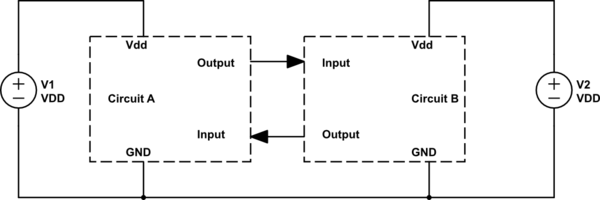Assume the following, generic, configuration in which two digital circuits are interconnected but have independent power supplies (e.g. two redundant microcontrollers).
<!-- Begin schematic: In order to preserve an editable schematic, please
don't edit this section directly.
Click the "edit" link below the image in the preview instead. -->

<!-- End schematic -->
Now, what happens if V1 is ON but V2 is OFF (or vice versa)? I generally protect against this scenario by inserting resistors on the lines such that the short circuit current is below the max sink current of the pins.
1. Is that necessary? What would happen to the transistor level if no protection was included? Generally, enhancement mode MOSFETs are used, which means all switches are OFF (open) when no voltage is present, therefore I do not understand why there would be an issue.
2. Are there other means of protection? Those resistors prevent me from running communication lines at high frequency because of the time constant with the input capacitance.
This must be a question that has already been addressed but I can't seem to find any on SE.